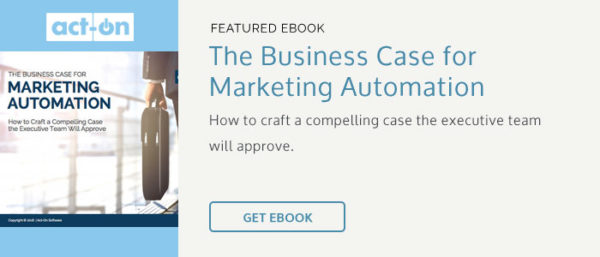
Marketing automation (MA) may have once seemed like an abstract concept and just a buzzword, but since the early 90s it has evolved substantially and now effectively performs a range of essential marketing tasks. The results it brings to marketers today are very real, and very beneficial.
In fact, businesses that use marketing automation to nurture prospects experience as much as a 451 percent increase in qualified leads. Surprisingly, however, a decent percentage of marketers, about one-quarter, are still not using MA.
But if marketing automation is so powerful, how can it transform marketing for your company?
Marketing automation: The nuts and bolts
The power of marketing automation resides in its ability to automate and measure marketing activities. Management expert Peter Drucker said, “You can’t manage what you can’t measure.” This idea is at the heart of marketing automation.
Marketers handle a lot of routine tasks every day. Many of these tasks don’t need the special skills that marketers possess — they simply need to be done. Automation removes these tasks from marketers’ lists. For instance, you can send emails after certain time delays or trigger more emails based on actions like “opens” and “clicks.” Automating these actions can greatly benefit your business. Here are four ways automation is helping marketers achieve great results.
1. The gift of time: Marketers become more effective
Digital marketing expert Jay Baer said that “social media allows big companies to act small again.” Marketing automation works in a similar fashion, because it allows personalized actions to be scaled, which saves time and maximizes resources.
In fact, a large percentage of marketing automation users report that one of the largest benefits of this type of technology is time savings. Repetitive marketing tasks are automated, such as:
- Social media updates and posts. Automating social posts can save more than six hours per week on social media management.
- More relevant content is provided. When companies show customers more relevant content and offers based on past shopping history, they can increase average sales by 20 percent.
- Speed up the sales cycle. When you gain the ability to automate tasks, you can greatly speed up the sales cycle.
Waking up in the morning, everyone has the same 24 hours in a day. For many people, at least eight of those hours are spent at work — and most workers want to leave feeling like they got a lot accomplished. Marketing automation creates that feeling through time savings.
2. Customer engagement feels more authentic
Content marketing keynote speaker and best-selling author Ann Handley said, “Even when you are marketing to your entire audience or customer base, you are still simply speaking to a single human at any given time.”
Marketers are tasked with making each customer feel like they are truly known by the brand — and, in many cases, the marketer has never met the customer.
MA helps marketers achieve this high level of engagement because it assists with delivering the right content at the right time. Increased engagement also helps companies capture more leads. Eighty percent of marketing automation users observed a 77 percent spike in conversions. Plus, B2B marketers who implement marketing automation increase sales-pipeline contributions by 10 percent. This technology achieves engagement through:
Delivering the right message at the right time. Nurturing leads is critical to building engagement. Instead of blasting the audience with messages you guess or assume are relevant, marketing automation provides “spot on” messaging through accurate insights and data. Email campaigns are deployed with greater accuracy, resulting in higher open rates and increased conversions.
More effective social engagement. A large chunk of your audience is active on social, whether it’s LinkedIn, Twitter, or another platform. Many of these customers, however, are not active during normal business hours. Marketing automation helps you stay active on social at the exact moments when your target audience is present, resulting in greater engagement.
Personalized website and email content. Personalized and dynamic content ensures that customers feel truly known. Marketing automation allows content to be matched precisely to the individual.
Engagement is the foundation of the customer relationship. Without engagement, it’s difficult to successfully move prospects through the buying journey. Once you build these relationships, marketing automation can help increase success through upselling and cross-selling.
3. Increased opportunities to upsell
Have you visited Amazon.com recently? If so, you may have bought a product that requires replacement items. For example, the purchase of a water purifier would eventually require additional filters. At the period of time when a customer would typically need these replacement items, the retailer could present the products. Additionally, the retailer could serve up items that others viewing similar products purchased. Marketers know the value of upsells and cross-sells. All those little add-ons can have a powerful effect on the bottom line. Marketing automation helps identify these opportunities and capture those sales.
In fact, studies show that companies that use marketing automation outperform companies that don’t by 59 percent. Here are a couple of ways that marketing automation helps you to upsell customers more effectively.
Leverage past purchase data. Providing customers with targeted recommendations that show what they may need to purchase based on previous buying patterns helps you easily serve up relevant offers and upsells. For example, let’s say a customer recently purchased an online SEO service. If so, he or she may be interested in buying the additional consulting package that goes with this service.
Leverage website activity. Having insight into customers’ behavior when they visit your website is helpful. A customer who first visits your pricing page and then downloads a pricing guide is highly engaged with your products. You can use these two behaviors as a trigger. As a result, a targeted email is sent to the customer, asking whether he or she would like to schedule a demonstration of the product.
Marketing automation provides the ability to capture new opportunities that marketers otherwise wouldn’t have the time or bandwidth to pursue. A large piece of capturing these opportunities, however, is effectively scheduling key communications.
4. More precisely timed communications
A famous Roman philosopher named Seneca said that “luck is what happens when preparation meets opportunity.” Marketing automation helps you prepare communications in such a way that you’re in front of the customer at precisely the right moment. It can help you:
Deploy communication by season. Depending on what industry segments you serve, your customers may have prime times for various opportunities. For example, school districts may make the majority of purchase investments in the early fall. Or some companies may be making last-minute purchases at the end of the year. They have excess budget left, and need to spend it or face the risk that finance will lower their budget for the coming year. Automated campaigns triggered by these specific periods of time can help you more effectively seize these opportunities.
Save unhappy customers. You have a small window of opportunity to save unhappy customers, and marketing automation can help you accomplish this. Yet we can’t call every single customer and give them the TLC they require — it’s simply not scalable. So instead you can use triggers to identify which customers may need extra attention.
Launch retention campaigns. A company that experiences a high attrition rate may not be sure why its customers are leaving. After studying the issue, its management may determine that customers are leaving most frequently at the one-week and three-month marks. As a result, the company can use marketing automation to create education-nurturing campaigns, including high-value content addressing common customer problems.
Engaging with customers more accurately
Marketing automation helps you understand customers in context so you can more effectively discover and deliver what they need most. No longer are you guessing what they want and when they want it. You know with absolute accuracy, and can deliver more relevant content and offers.
As a result, you can build more authentic relationships and drive greater impact for your brand in a way that is measurable, concrete, and more effectively scales your existing resources.
Are you using marketing automation? If so, what are the major results you’ve experienced? Please share!
